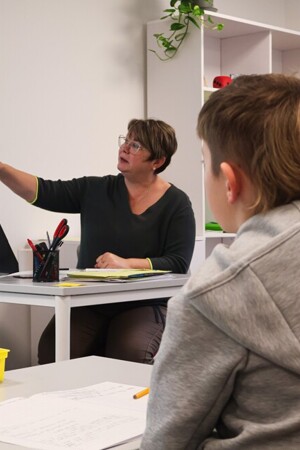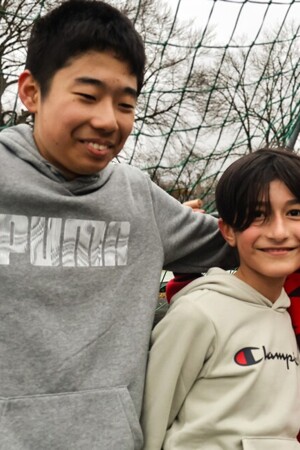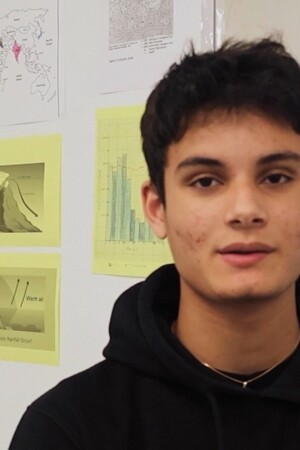British Curriculum
- Home
- Curriculum
- The British Curriculum
- Key Stage 1
Key Stage 1
At BSG, Key Stage 1 is a time of joyful discovery and steady progress. We focus on nurturing the whole child—academically, socially, and emotionally—setting a solid foundation for success in Key Stage 2 and beyond.
Key Stage 1 Year 1 to 2
At The British School in Gothenburg, Key Stage 1 (KS1) marks a crucial transition in a child's educational journey—from learning through play in the Early Years Foundation Stage to developing a more structured understanding of the world around them. KS1 includes Year 1 and Year 2, and during these formative years, our students begin to build the core academic, social, and emotional skills that will support them throughout their school life.
A Curriculum That Inspires
Following the National Curriculum for England, our KS1 programme offers a broad, balanced and creative approach. It is carefully designed to nurture curiosity, promote independence, and establish a lifelong love of learning.
The learning environment remains joyful and exploratory, while gradually introducing structure through integrated themes and subject-based learning. A central text or topic often guides each term, allowing connections to be made across subjects—helping students see how ideas and knowledge are linked in the real world.
Core subjects
Our updated Primary English programme nurtures a lasting love of reading, writing and oral communication. It helps pupils build their English proficiency for a variety of contexts and audiences.
Students build competencies in four key areas—reading, writing, speaking and listening. Through exposure to a variety of texts, media and information, they learn to communicate clearly and adapt to different contexts, enabling them to:
-
Grow into assured communicators who can draw on all four skills in everyday life
-
See themselves as readers, exploring a diverse mix of texts—both for learning and enjoyment—from across cultures and eras
-
See themselves as writers, creating clear, imaginative pieces tailored to different audiences and purposes
Our primary maths curriculum instils a lifelong passion for logical and critical thought.
Pupils gain a comprehensive grasp of mathematics by exploring core principles, patterns, systems, functions, and relationships. They’ll develop strong computational fluency and the ability to apply mathematical methods to real-world problems.
A standout element of our programme is ‘Thinking and working mathematically’, which encourages students to discuss ideas, question assumptions, and back up their reasoning with clear evidence. By engaging this way, learners actively piece together concepts, procedures, and facts—fostering advanced thinking skills and enabling them to interpret the world through a mathematical lens.
Our primary science programme inspires a lasting curiosity about the natural world and equips pupils to seek scientific explanations for the phenomena they encounter.
Students will learn to think like scientists, honing practical skills alongside factual knowledge and conceptual understanding—essential tools for interpreting the world around them. By raising awareness of everyday science, we help every learner feel that “science is for me,” forging a personal connection to the subject.
This foundation not only prepares students for advanced science study in later years but also empowers them to make well-informed decisions—whether that involves sustainability considerations or tackling environmental challenges.
Foundation subjects
Art & Design offers pupils a mean to express their ideas, ignite their imagination, and cultivate versatile skills. Through exploration and experimentation, students become thoughtful, analytical, and confident decision-makers, learning to articulate personal interpretations of their experiences.
They build creative abilities that will support their future learning and growth by:
-
Viewing themselves as artists—growing more self-reflective and independent
-
Mastering techniques to convey imaginative concepts and communicate through visual media
-
Recognizing their own role—and that of others—in a dynamic, inventive, and interconnected world
Our Computing curriculum helps learners understand how computers work. This stimulating course gives students the opportunity to look inside a computer to understand the purpose of different components. They will develop coding skills on visual programming languages, such as Scratch, and learn that computers can only perform actions that humans ask them to do.
Students develop the computational thinking skills and vocabulary they need to:
- extract key information from a set of instructions, break down problems into smaller parts and recognise patterns within sequences of instructions
- present sequences of instructions both verbally and visually, with increasing precision
- think logically to identify and solve errors in increasingly complex computing scenarios
- see themselves as computer scientists and understand how skills such as programming and logical thinking help in local and global industries
- understand the role that computers, other machines and data play in their lives.
Primary Design & Technology equips pupils to:
- Research & Plan: Identify users’ needs, explore existing solutions, and draft clear plans.
- Create & Build: Safely use tools and materials to construct prototypes, applying knowledge of structures, mechanisms, circuits, and material properties.
- Test & Improve: Evaluate designs against criteria, pinpoint strengths and weaknesses, and refine their work.
- Think Critically & Creatively: Solve problems when plans go awry, consider sustainability and ethics, and appreciate how DT shapes everyday life.
Primary Geography equips pupils to:
- Locate & Recognize places using maps, atlases and globes (continents, oceans, UK countries and capitals).
- Compare & Contrast different regions (UK vs. non-European) by exploring physical and human features.
- Understand Processes by studying landforms (rivers, coasts, mountains), climates, land use, settlements and trade.
- Investigate & Record through fieldwork and data collection (e.g., surveys, weather) and present results with simple maps, charts and graphs.
- Enquire & Communicate by asking geographical questions, using diverse sources, drawing conclusions and sharing findings.
- Reflect & Act on human impacts (pollution, resource use) and consider sustainable ways to care for local and global environments.
Primary History aims to give pupils both substantive knowledge of the past and the skills to think and act like historians.
-
Understand Time: Place events and people on timelines, using terms like “century” and “decade.”
-
Know Key Periods: Learn about changes within living memory.
-
Use Historical Concepts: Explore continuity and change, cause and effect, similarity and difference, and significance.
-
Investigate Sources: Ask historical questions, examine artifacts and documents, and assess source reliability.
-
Tell Historical Stories: Recognize different interpretations, build coherent narratives, and share findings through talk, writing, or creative projects.
-
Connect Locally: Study their own community’s past and link it to broader national or global events.
Music ignites creativity and nurtures confidence. It enables students to articulate ideas and underscores the value of communication as they engage with fellow musicians and connect with audiences.
Students engage with music as performers, composers, and critical listeners. They study and create music spanning cultures, eras, and genres, fostering leadership, teamwork, and self-assurance.
Cambridge Primary Music students will:
-
Experience the joy of music through purposeful, enjoyable activities
-
Acquire the knowledge, skills, and mindset to contribute meaningfully as musicians
-
Collaborate expressively via singing and instrumental performance
-
Cultivate individual and collective creativity
-
Apply their growing expertise to conceive and develop original, relevant musical works
These creative skills will support their broader learning and personal growth.
Physical Education is essential to a well-rounded curriculum. Regular activity boosts physical and mental health—and research shows it can enhance academic performance. Building good exercise habits in primary school lays the groundwork for a lifelong active lifestyle.
PE is about “learning to move” and “moving to learn.” Through games, gymnastics, dance, and other age-appropriate activities, pupils will:
-
Grow in confidence, demonstrating greater control, fluidity, and creativity of movement
-
Deepen their grasp of rules, tactics, strategies, and choreographic concepts
-
Participate safely and respectfully, both individually and as team members
-
Understand how PE supports a healthy, active life
-
Develop transferable physical, cognitive, and social skills—becoming independent, critical, and reflective movers and thinkers
These competencies underpin their broader learning and personal development
Learning and Assessment
Assessment in Key Stage 1 is continuous, supportive, and informal. Teachers observe and interact with children throughout lessons, using tools such as:
-
Targeted questioning
-
Real-time feedback
-
Group work observation
-
Marking and reflection
-
Short quizzes and practical activities
This formative approach allows teachers to tailor instruction and ensure every child receives the support and challenge they need.




